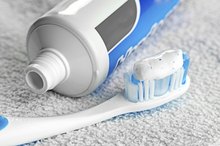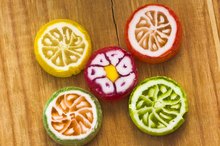What does fact checked mean?
At Healthfully, we strive to deliver objective content that is accurate and up-to-date. Our team periodically reviews articles in order to ensure content quality. The sources cited below consist of evidence from peer-reviewed journals, prominent medical organizations, academic associations, and government data.
The information contained on this site is for informational purposes only, and should not be used as a substitute for the advice of a professional health care provider. Please check with the appropriate physician regarding health questions and concerns. Although we strive to deliver accurate and up-to-date information, no guarantee to that effect is made.
Regulated by the FDA as a food additive, sugar substitutes—also known as artificial sweeteners—provide many times the sweetness of table sugar 1. Because they are so intensely sweet, sugar substitutes enhance the sweetness of foods and beverages with few or no added calories, making them a popular diet food ingredient. Some sugar substitutes derive from natural products while others are synthetic, but whatever their source, they may cause unhealthy side effects when included as part of your diet.
Saccharin
Saccharin, the sweetening agent in Sweet’N Low, offers 300 times the sweetness of table sugar. Once linked with the development of bladder cancer in rats, saccharin is not a human carcinogen, explains the National Cancer Institute 1. However, if you are allergic to sulfa drugs, saccharin can cause itching and hives when ingested. If you are sensitive to sulfa drugs, choose an artificial sweetener other than saccharin to avoid an allergic reaction.
- Saccharin, the sweetening agent in Sweet’N Low, offers 300 times the sweetness of table sugar.
- However, if you are allergic to sulfa drugs, saccharin can cause itching and hives when ingested.
Aspartame
Xylitol Vs. Stevia
Learn More
Aspartame consists of two amino acids, aspartic acid and phenylalanine, bonded together. Marketed as NutraSweet or Equal, aspartame is 180 times sweeter than table sugar. The amino acids contribute calories to your diet, but the amount of aspartame eaten is generally low enough that the calories are negligible. When ingested, aspartame breaks down into its component amino acids. The presence of phenylalanine in your diet is a health hazard if you have phenylketonuria, an inborn disease in which you are unable to properly metabolize phenylalanine 3. The Mayo Clinic recommends avoiding any foods or medications containing aspartame if you are phenylketonuric.
- Aspartame consists of two amino acids, aspartic acid and phenylalanine, bonded together.
- The Mayo Clinic recommends avoiding any foods or medications containing aspartame if you are phenylketonuric.
Cyclamate
Currently banned in the U.S. but approved as a food additive in 50 other countries, including Canada, cyclamate is 30 times sweeter than table sugar. Health risks associated with cyclamate use include chromosome damage and bladder cancer. However, points out the American Council on Science and Health, no researchers have reproduced these results in subsequent studies on cyclamate ingestion. With the health effects of cyclamate in dispute, err on the side of caution and avoid cyclamate if you are concerned with its possible health risks.
- Currently banned in the U.S. but approved as a food additive in 50 other countries, including Canada, cyclamate is 30 times sweeter than table sugar.
- However, points out the American Council on Science and Health, no researchers have reproduced these results in subsequent studies on cyclamate ingestion.
Polyols
Foods Containing Sucralose
Learn More
Polyols are sugar alcohols such as xylitol, mannitol and sorbitol. They occur naturally in foods such as apples and berries, and are approximately as sweet as table sugar. Polyols do contribute calories when eaten but, because they are not completely absorbed and metabolized by your body, they don’t add as many calories to your diet as regular sugar. Exercise caution when using polyols as a sugar substitute, however, because in high doses they may cause a laxative effect.
- Polyols are sugar alcohols such as xylitol, mannitol and sorbitol.
- Polyols do contribute calories when eaten but, because they are not completely absorbed and metabolized by your body, they don’t add as many calories to your diet as regular sugar.
Related Articles
References
- National Cancer Institute: Artificial Sweeteners
- Elmhurst College: Aspartame
- Mayo Clinic: Phenylketonuria
- Artificial Sweeteners and Cancer. National Cancer Institute. National Institutes of Health.
- Aspartame. American Cancer Society.
- Additional Information about High-Intensity Sweeteners Permitted for use in Food in the United States. U.S.Food and Drug Administration.
- Center for Science in the Public Interest. Chemical Cuisine. Learn About Food Additives.
- Qing Yang. " Gain Weight by “Going Diet?” Artificial Sweeteners and the Neurobiology of Sugar Cravings." Yale Journal of Biology and Medicine, June 2010.
Writer Bio
A writer since 1985, Jan Annigan is published in "Plant Physiology," "Proceedings of the National Academy of Sciences," "Journal of Biological Chemistry" and on various websites. She holds a sports medicine and human performance certificate from the University of Washington, as well as a Bachelor of Science in animal sciences from Purdue University.









